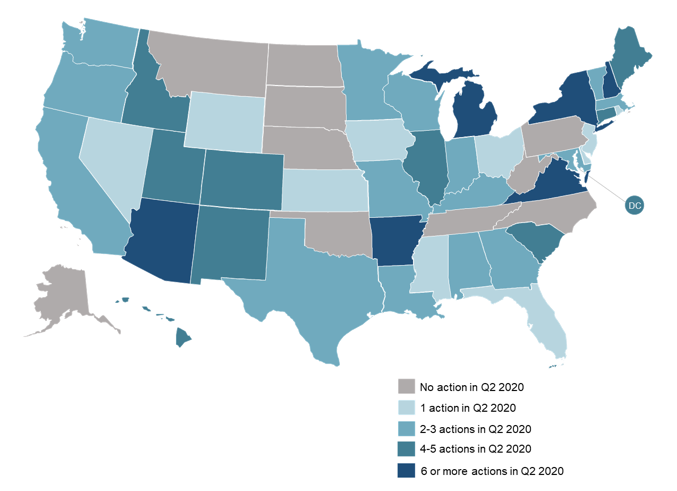The 50 States of Solar: All Eyes on FERC During Q2 2020
Raleigh, NC – (July 22, 2020) The N.C. Clean Energy Technology Center (NCCETC) released its Q2 2020 edition of The 50 States of Solar. The quarterly series provides insights on state regulatory and legislative discussions and actions on distributed solar policy, with a focus on net metering, distributed solar valuation, community solar, residential fixed charges, residential demand and solar charges, third-party ownership, and utility-led rooftop solar programs.
The report finds that 40 states, plus the District of Columbia, took some type of distributed solar policy action during Q2 2020 (see figure below), with the greatest number of actions continuing to address net metering policies (54), community solar policies (36), and residential fixed charge or minimum bill increases (27). A total of 156 distributed solar policy actions were taken during Q2 2020, with the greatest number of actions taken in Virginia, New York, Arkansas, and New Hampshire.
Q2 2020 Policy Action on Net Metering, Rate Design, and Solar Ownership

The report identifies three trends in solar policy activity taken in Q2 2020: (1) stakeholders expressing broad opposition to federal jurisdiction over electricity sales from customer-generators, (2) states establishing future triggers for net metering successor tariff development, and (3) states and utilities considering metering and billing infrastructure issues related to distributed generation compensation programs.
“While our focus is usually at the state level, all eyes were on FERC during Q2 2020, awaiting its decision on a petition related to net metering,” noted Brian Lips, Senior Policy Project Manager at NCCETC.
The report notes the top five distributed solar policy actions of Q2 2020:
- A petition filed with the Federal Energy Regulatory Commission (FERC) regarding federal jurisdiction over net metering;
- Arkansas regulators issuing a decision to continue retail rate net metering;
- Kentucky Power filing the first net metering successor tariff proposal in Kentucky;
- Hawaii launching Phase 2 of the Community-Based Renewable Energy Program; and
- The Illinois Commerce Commission opening a proceeding to set the value of its distributed generation rebate, which will eventually replace retail rate net metering in the state.
“We were closely monitoring the net metering petition filed with FERC during the quarter,” said Autumn Proudlove, lead author of the report and Senior Manager of Policy Research at NCCETC. “If approved, this petition would have led to a dramatic change in the way distributed solar is compensated, and ultimately project economics across the country.”
View the 50 States of Solar Q2 2020 Executive Summary
View and Purchase the 50 States of Solar Q2 2020 update FULL Report
View other 50 States Reports – Solar, Grid Modernization and Electric Vehicles
ABOUT THE N.C. CLEAN ENERGY TECHNOLOGY CENTER
The N.C. Clean Energy Technology Center, as part of the College of Engineering at North Carolina State University, advances a sustainable energy economy by educating, demonstrating and providing support for clean energy technologies, practices and policies. It serves as a resource for innovative, sustainable energy technologies through technology demonstration, technical assistance, outreach and training. For more information about the Center, visit: http://www.nccleantech.
Media Contact: Shannon Helm, NCCETC, shannon_helm@ncsu.edu